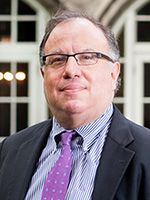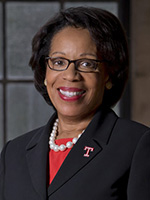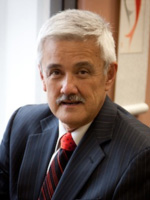On May 26 and 27, Drexel University’s Kline School of Law hosted “Leaning into Uncertainty: Ensuring Quality Legal Education During Coronavirus.” Decision-makers from nearly every ABA-accredited law school attended the virtual roundtable conference, which created a space for them to share concerns, pool knowledge and develop strategies to address the challenges of the upcoming academic year as they continued to prepare for various reopening scenarios at their respective institutions.
 Daniel Rodriguez, Harold Washington Professor of Law at Northwestern University Pritzker School of Law
Daniel Rodriguez, Harold Washington Professor of Law at Northwestern University Pritzker School of Law
Daniel Rodriguez, who has served as dean at several law schools including Northwestern University Pritzker School of Law, where he is currently the Harold Washington Professor of Law, delivered the opening plenary presentation. “This is a time—an imperative time—for collaboration and cooperation,” he said, calling for the legal education community to come together and use their collective wisdom to make “smart and distinctive” choices.
What followed was two days of intense discussion among law school deans, professors and administrators wrestling with the complexities of delivering high-quality instruction across all modalities in ways that are safe and accessible. While virtual classrooms were a major topic of discussion, the conference broadened the conversation about the coming academic year with roundtables dedicated to curriculum design, experiential learning opportunities, student wellbeing, faculty and staff morale, and institutional health.
At the start of each roundtable, presenters briefly framed their topic, providing prompts and questions for participants to address in small groups. At the end of the session, participants shared stand-out thoughts and ideas from their breakout discussions. Some sessions had 400 people in attendance.
 JoAnne Epps, executive vice president and provost of Temple University
JoAnne Epps, executive vice president and provost of Temple University
The second day of the conference was opened by JoAnne Epps, former dean of Temple University’s Beasley School of Law and current executive vice president and provost of Temple University. Epps encouraged the audience to feel confident in their ability to counsel their institutions through times of uncertainty, because that’s what they were trained to do as attorneys. Leadership, Epps said, has to pivot from a reactionary response to a proactive response. In order to do this, Epps encouraged attendees to hold to their institutional values and priorities.
 Bill Adams, managing director of the American Bar Association
Bill Adams, managing director of the American Bar Association
The conference came to a close with a plenary talk from Bill Adams, managing director of the American Bar Association (ABA), who discussed ABA guidance for the upcoming year. He assured participants that the ABA’s approach in responding to the pandemic will be one that acknowledges the need for continued flexibility, given that no one knows how circumstances will evolve in the fall and spring.
“The conference was a success by any measure. Participants not only were able to test their fall plans and discover other strategies, but they made connections with similarly situated leaders at other law schools,” said Dan Filler, dean and professor of law at Kline School of Law. “It didn’t just help ensure quality legal education across the country next fall—though it did that. It actually helped develop a community of educators who can continue to work through challenges and develop new ideas, as the coming year unfolds.”
Conference Reports
By the end of the conference, leaders in legal education from around the country had identified numerous challenges faculty, staff, and students may face in the coming year, along with strategies to address them. Hundreds of pages of notes collected during roundtable breakout sessions have been distilled and organized by topic in the conference reports below: